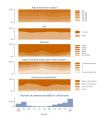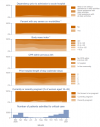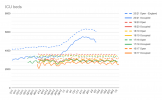Technically its 99.95% as its 237458 have received 1st dose out of population of 237565. Im a bit dubious myself but all the other regions are above 95% except London but there lagging behind in all age groups.
The wider point im making is takeup is way above 70% threshold needed to bring virus under control so we should be able to accelerate relaxation of restrictions although that can't be dated until the govt defines the criteria its going to use on 22 Feb.
SAGE
data released today confirms 2% of deaths occur in <50 year olds which rises to c6% <60 year olds. So we are close to achieving >60 year olds 1st dose thus offering the potential to mitigating over 90% of deaths yet they are proposing to keep restrictions on well into Spring should be challenged. I do hope that the 1922 committee will be consulted over Boris's roadmap before 22/2 so it has a reality check over the principles.



